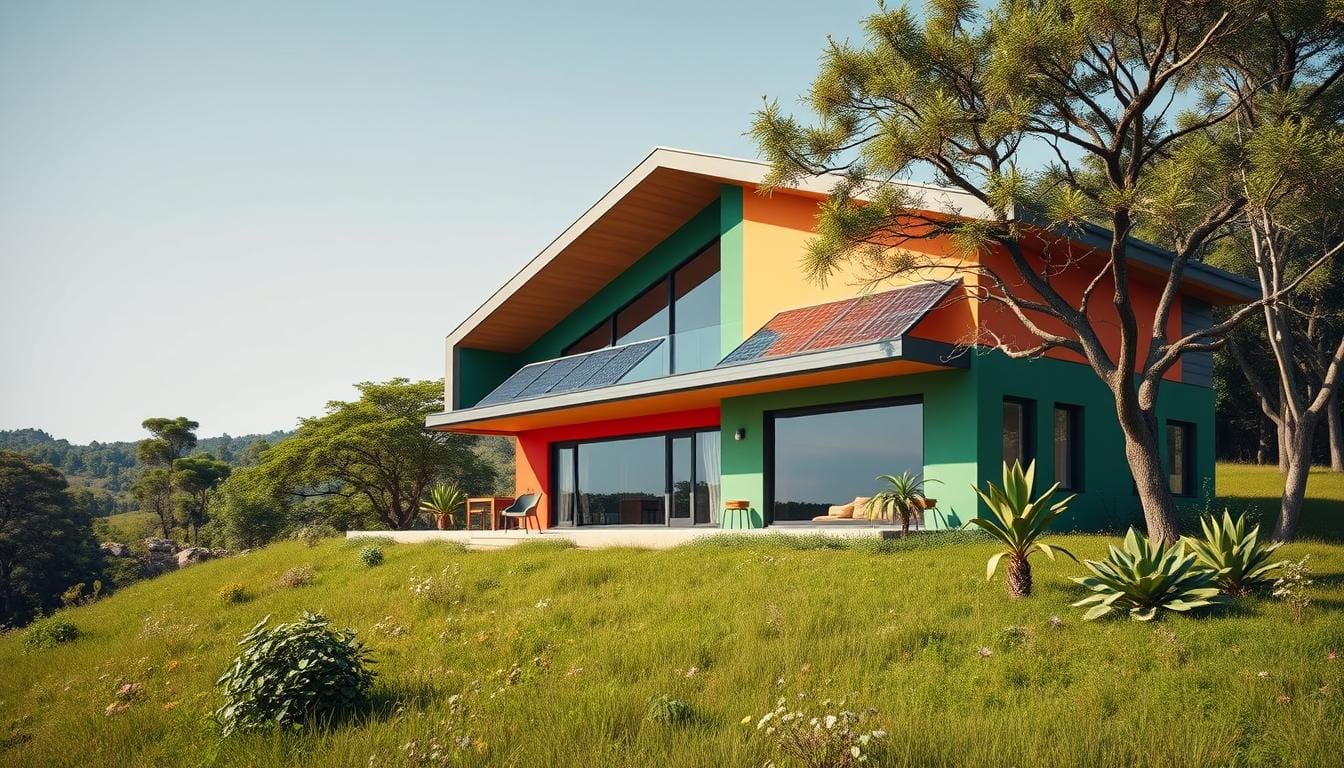Austrian prefab homes are getting a lot of attention from people looking to buy a home. They offer a mix of sustainability, affordability, and modern design. This makes them a great choice for building your dream home.
These homes focus on innovation and being eco-friendly. This has made prefab houses in Austria a symbol of modern living.
We will look into why prefab homes are becoming more popular. We’ll also explore their benefits, the main players in the market, and the rules that govern this industry in Austria. Modular living, like the FlexHome concept, offers a range of living spaces.
Building a complete house can take as little as four weeks. This is thanks to precise techniques and modern tools. Companies like Karmod and Haas Fertigbau are leading the way with their quality and commitment to the environment.
Key Takeaways
- Austrian prefab homes are popular for their quick construction times and cost-effectiveness.
- FlexHome provides versatile living options and is highly demanded in the market.
- The manufacturing process is precise, involving detailed quality control and the use of advanced tools.
- Leading companies like Karmod and Haas Fertigbau are at the forefront of the Austrian prefab market.
- Eco-friendly practices and modern amenities are integral to these innovative homes.
- Transporting modular homes requires careful handling due to their size and weight.
Overview of Prefabricated Homes in Austria
Prefabricated homes are becoming more popular in Austria. People want homes that are efficient, sustainable, and can be customised. The market for modular homes is growing at a rate of 4% each year from 2024 to 2029.
Companies like VARIO-HAUS, Swietelsky AG, Wolf Holding GmbH, and ELK Fertighaus GmbH are leading the way. They focus on innovation and quality.
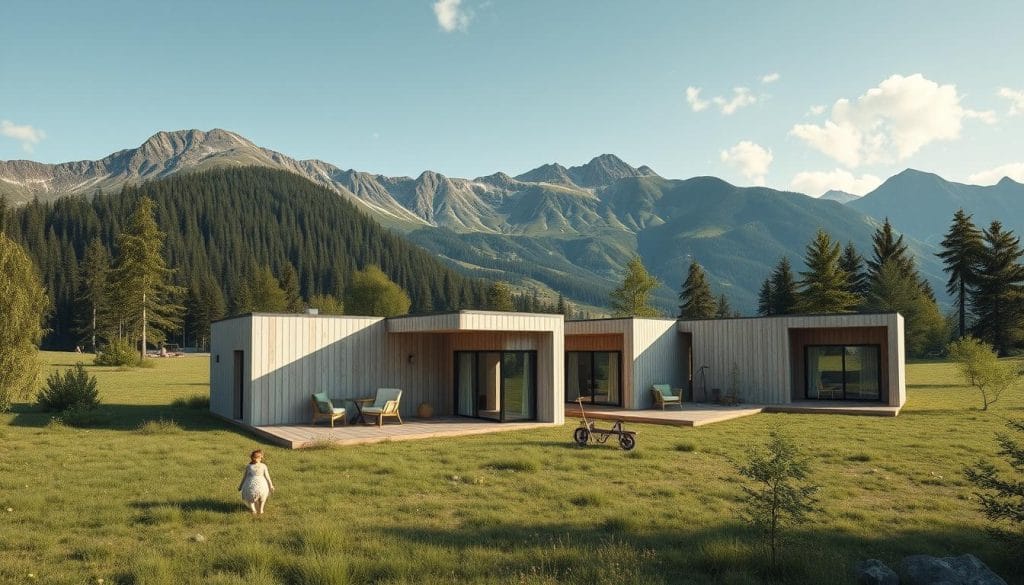
Definition and Characteristics
Modular homes in Austria come in different styles. They are built in a factory and then put together on-site. These homes are known for:
- Being energy efficient, sometimes even better than low-energy homes.
- Being built quickly, from factory to home.
- Being flexible in design, so they can be tailored to what you want.
Popularity and Trends
Prefab homes are getting more popular in Austria. This is due to several trends:
- Sustainability: Prefab homes are seen as eco-friendly, appealing to those who care about the environment.
- Cost-Effectiveness: Prices range from €107,910 for a basic Duplex Trio to €435,470 for a fully equipped New Design SkyView. This suits different budgets.
- Tourism Influence: Austria’s strong tourism industry helps grow the demand for prefab homes.
These factors mean modular homes in Austria will keep attracting interest. It’s an exciting area of the housing market.
The Benefits of Choosing Prefab Homes
Prefab homes in Austria offer many benefits. They save money, are built quickly, and focus on being green. These homes are a modern way to live affordably.
Cost-Effectiveness
Prefab homes are very cost-effective. Companies like Karmod make homes in Austria that are both affordable and sustainable. They use less waste and resources, which saves money.
Building homes this way also makes them cheaper. So, affordable housing in Austria is now a reality, not just a dream.
Speed of Construction
Prefab homes are built fast. Karmod’s prefab steel buildings are made for quick assembly. This saves on labour costs and means homes are ready sooner.
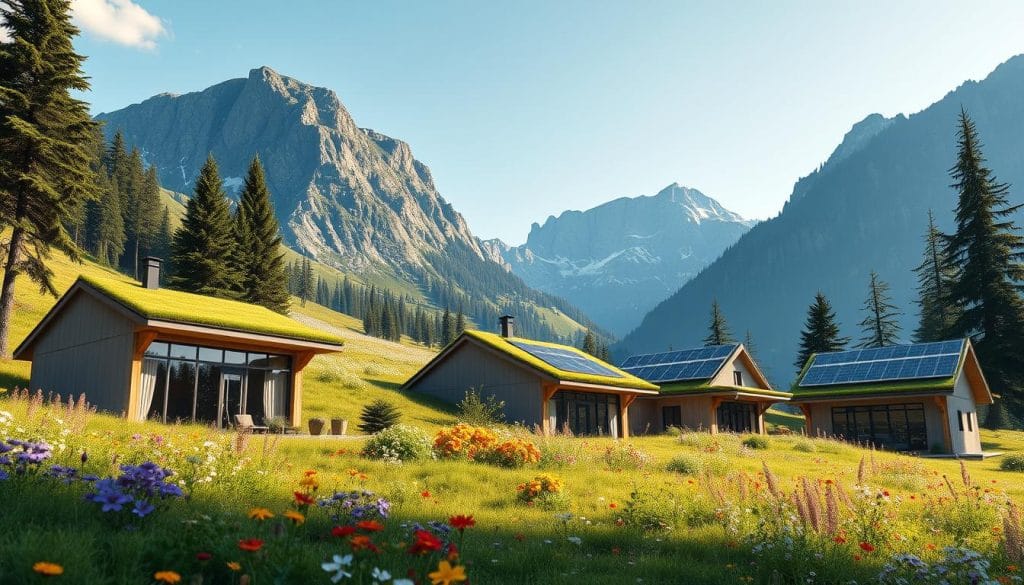
Sustainability and Energy Efficiency
Prefab homes in Austria are green. They use eco-friendly materials and are designed to save energy. This means they have a small environmental impact and save money on bills.
Karmod is committed to building homes that are good for the planet. This shows that affordable housing can be both green and of high quality.
Key Players in the Austrian Prefab Market
The Austrian prefab home market is growing, even with global challenges. The demand for prebuilt homes in Austria shows the market’s strength and flexibility. Many leaders are pushing innovation and sustainability in the industry.
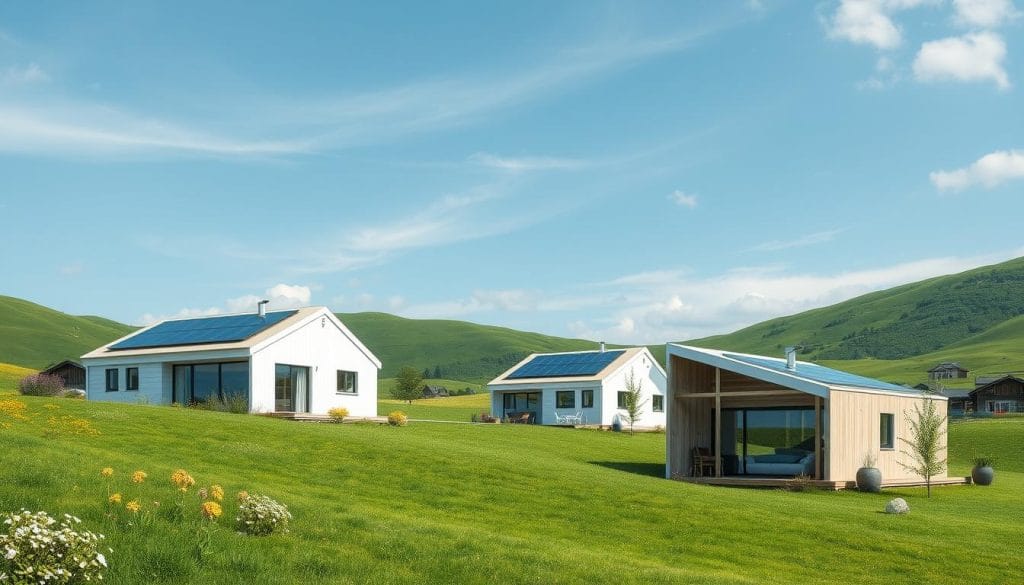
Leading Companies
Several top companies lead the Austrian prefab market. Swietelsky AG, ELK Fertighaus GmbH, and Wimberger Holding GmbH are among the leaders. They have made significant contributions:
- Swietelsky AG: Known for advanced building tech and quality service, Swietelsky AG meets various residential needs. They ensure timely delivery and customization.
- ELK Fertighaus GmbH: A leader in sustainable construction, ELK Fertighaus GmbH uses eco-friendly materials and energy-efficient solutions. They are a top choice for those who care about the environment.
- Wimberger Holding GmbH: Focused on innovation, Wimberger Holding GmbH offers customizable options. They cater to different tastes, from simple to complex designs.
Innovative Designs
Innovation is key in the prefab home market in Austria. Companies like Kieninger Gesellschaft and Georg Fessl GmbH are leading the way with new designs and sustainable practices:
- Kieninger Gesellschaft: They specialize in modular designs that fit specific locations and climates. This promotes adaptability and personalization in prefab homes.
- Georg Fessl GmbH: They focus on using advanced materials and techniques. This improves the durability and look of prefab homes, meeting today’s living standards.
The market’s growth is clear, with prices expected to rise by 5.1% in 2023 and 3.9% in 2024. The dedication of these companies to innovation and quality has made prebuilt homes in Austria a popular choice for modern homes.
Regulations and Building Standards in Austria
Understanding the rules for prefab construction in Austria is key for success. Regulations ensure homes meet quality and safety standards. Companies like VARIO-HAUS work with the Austrian Prefabricated House Association to follow these rules.
Planning Permissions
Getting planning permission is the first step for prefab homes in Austria. Authorities need detailed plans to check if homes follow local rules. Each Austrian state has its own rules, so it’s important to talk to local offices early.
This helps avoid delays and makes the approval process smoother.
Quality Control Measures
Quality control is essential in prefab construction. Austria has strict measures to check the safety and strength of modular homes. Building partners use standards like the TABULA project to ensure homes are energy-efficient.
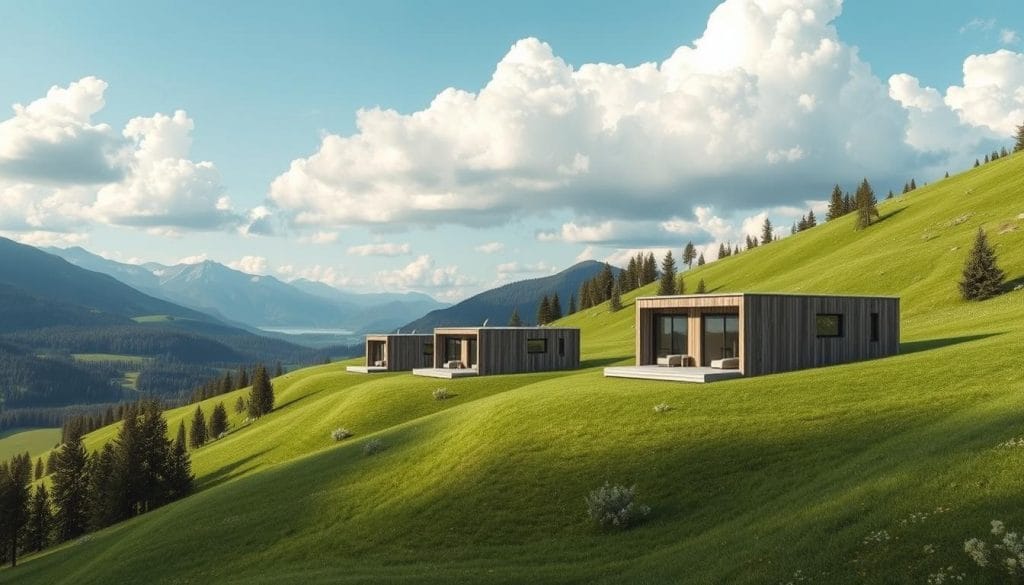
The Austrian government also encourages using eco-friendly materials. This has led to over 14,000 buildings meeting the passive house standard. These homes use up to 90% less energy for heating and cooling.
Choosing prefab or modular homes in Austria means lower emissions and cost savings. It’s a smart and sustainable choice for modern living.
Comparing Prefab Homes to Traditional Builds
When we look at prefab homes versus traditional builds in Austria, we see many differences. These range from how long it takes to build to how much you can customise. Knowing these differences helps you make a better choice.
Timeframes for Completion
One big plus of prefab homes in Austria is how fast they’re built. They can be finished much quicker than traditional homes. This is because the parts are made off-site and then put together quickly on-site.
VARIO-HAUS shows that prefab homes can be ready in weeks, not months. This speed is great for those who want affordable housing without waiting a long time.
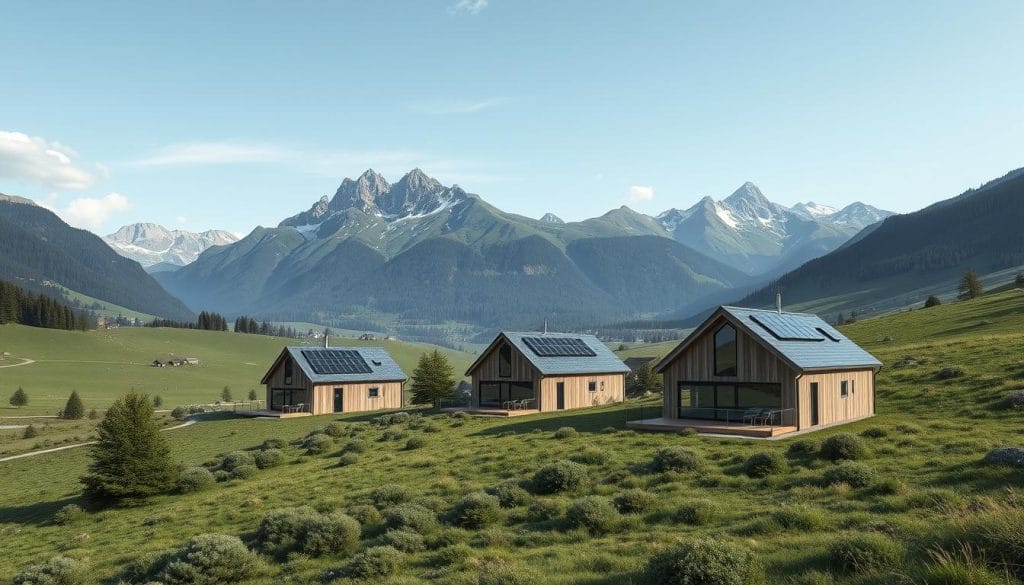
Customisation Options
Customisation is another important factor. Traditional homes offer a lot of design freedom. But prefab homes have also improved a lot in this area.
Companies like KAMPA and GRIFFNER in Austria are leading the way. They offer designs that are both stylish and functional. You can choose from many layouts, materials, and finishes.
This makes prefab homes not just practical but also personal. The rise of container homes also opens up more options for making your home unique. It lets you create a space that really fits your needs and style.
Future of Prefab Homes in Austria
The Austrian prefab home market is ready for big changes. New technologies and strong demand will drive this growth. Companies like VARIO-HAUS are making homes smarter and more energy-efficient. They focus on designs that are both innovative and sustainable.
Emerging Technologies
Smart home systems are becoming popular. They let you control your home with your phone. HUF HAUS is known for its energy-saving designs, using triple insulated glazing.
Prefab builders in Austria are using new methods. These methods ensure high quality and reduce waste. They aim to make homes warm and eco-friendly.
Market Forecast and Trends
The future for prefab homes in Austria looks bright. People want homes that are tailored to their needs and good for the planet. Companies like Maier are building homes quickly and efficiently.
With more focus on green energy, prefab homes are set to meet the demand. Visit KLH’s website for more on modern timber construction. The prefab home industry in Austria is leading the way in innovation and efficiency.




